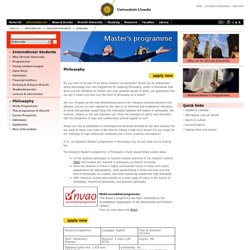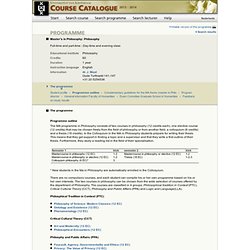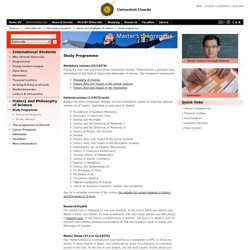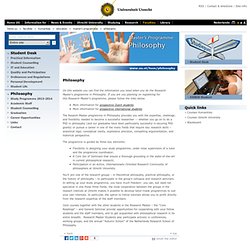

Philosophy - Master's Programmes - Humanities. On this website you can find the information you need when you do the Research Master's programme in Philosophy. If you are you planning on registering for this Research Master's programme, please follow the links below. The Resarch Master programme in Philosophy provides you with the expertise, challenge, and flexibility needed to become a successful researcher -- whether you go on to do a PhD in philosophy (and our graduates have been particularly successful in securing PhD grants) or pursue a career in one of the many fields that require key research skills – analytical rigor, conceptual clarity, expressive precision, compelling argumentation, and historical perspective.
The programme is guided by three key elements: History and Philosophy of Science - Master's programme. The Master’s programme in History and Philosophy of Science (HPS) offers a unique opportunity to study the foundations, practice and culture of science from historical and philosophical viewpoints. There are four thematic focus areas: History of Science or the Humanities The historical approach focuses on the development of knowledge and scientific practice in the past. It does not limit itself to the problems, methods and solutions studied by scientists, but extends its scope to include their interplay with cultural, social or institutional features at particular times and places. Subjects studied range from mathematics to disciplines in the humanities. Philosophy of Science The philosophy of science addresses general questions concerning the nature of scientific knowledge and scientific methods, but also includes conceptual analysis of fundamental theories such as relativity, quantum mechanics, evolution and modern genetics.
International Development Studies - Master's programme. International Development Studies focuses on the following issues: How to deal with climate change and ‘new scarcities’ (land, water and energy) and what are the implications for sustainable and equitable development? How to improve access to social services for the poor? How can international migration contribute to development against the background of globalization and restrictive migration policies? How to deal with rapid urbanization and megacities? What are the consequences of globalization for local economic development? What's your focus?
You are interested in the interrelated topics of development, mobility and access to natural resources. The Philosophy of Science in a European perspective - Home page. Philosophy - Master's programme. Do you want to be part of an active research environment?

Would you be enthusiastic about developing your own programme for studying Philosophy, within a framework that gives you the flexibility to choose your very personal course of study, yet guarantees that you get a broad overview over the field of philosophy as a whole? Master's in Philosophy: Philosophy - UvA Course catalogue - Programme description. The MA programme in Philosophy consists of two courses in philosophy (12 credits each), one elective course (12 credits) that may be chosen freely from the field of philosophy or from another field, a colloquium (6 credits) and a thesis (18 credits).

In the Colloquium in the MA in Philosophy students prepare for writing their thesis. This means that they get support in finding a topic and a supervisor and that they write a first outline of their thesis. Furthermore, they study a reading list in the field of their specialisation. * New students in the Ma in Philosophy are automatically enrolled in the Colloquium. There are no compulsory courses, and each student can compile his or her own programme based on his or her own interests. Philosphical Tradition in Context (PTC) Critical Cultural Theory (CCT) Philosphy and Public Affairs (PPA) Philosophy of Natural Sciences, Introduction ~ Masters in Leiden.
Study Programme - History and Philosophy of Science - International Masters. Mandatory courses (22,5 ECTS) During the first year you follow three compulsory courses.

These provide a graduate level introduction to the field of history and philosophy of science. The compulsory courses are: Philosophy of Science History, Role and Impact of the natural sciences History, Role and Impact of the Humanities Optional courses (7,5 ECTS each) Besides the three compulsory courses, you are expected to choose at least four optional courses out of twenty, depending on your area of interest. Foundations of Quantum Mechanics. Philosophy - Master's Programmes - Humanities. On this website you can find the information you need when you do the Research Master's programme in Philosophy.

If you are you planning on registering for this Research Master's programme, please follow the links below. The Resarch Master programme in Philosophy provides you with the expertise, challenge, and flexibility needed to become a successful researcher -- whether you go on to do a PhD in philosophy (and our graduates have been particularly successful in securing PhD grants) or pursue a career in one of the many fields that require key research skills – analytical rigor, conceptual clarity, expressive precision, compelling argumentation, and historical perspective.
The programme is guided by three key elements: